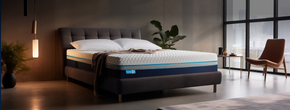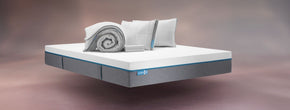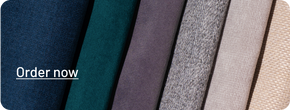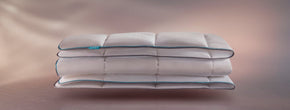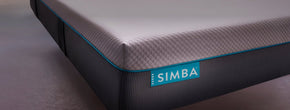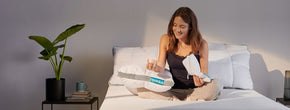Thread Count - What Does It Mean & What Is A Good Thread Count?

Having soft, breathable bed linen not only feels nice, but is important for a good night's sleep. It helps keep your body temperature regulated, so you don’t run too hot or too cold. However, how do you know what makes ‘good’ bed linen? And what should you look out for? Thread count can be a useful starting point for finding the right bed linen or duvet set for you. In this guide, we’ll be going through everything you need to know about thread count, as well as other key indicators to look out for.
What does thread count mean?
Thread count literally refers to counting the number of threads in a square inch of fabric. Threads are strands of fabric that have been twisted tightly then weaved together.
They can be made from a wide range of materials, all which have different properties. A thread count indicates how tightly woven together these threads are, as well as how many threads there are in a piece of material.
So how is thread count actually calculated? It’s determined by counting the number of horizontal threads. These are the threads going right-to-left, and are known as the warp. These are then added to the number of vertical threads. These go top-to-bottom, and are known as the weft.
What is a good thread count for sheets?
Although thread count is a useful tool for assessing fabric quality, there isn’t a single thread count number that indicates whether something is good or not. We’ll get into why this is a little later on.
As a rule of thumb, bed linen and sheets with thread counts between 200 to 600 will be comfortable to sleep in. Anything below 200 might not be quite as soft, but this does depend on the fabric used. It should also be noted that the lower the thread count, the lighter the linen will feel. Likewise, the higher the thread count, the denser and heavier the sheets may feel. What is right for you all depends on personal preference.
Thread count chart
To help you figure out what fabric and corresponding thread count is for you, we’ve pulled together a chart. This contains common bed sheet materials, their optimum thread count, and key characteristics that this type of fabric is known for.
Type of Material |
Key Characteristics |
Optimum Thread Count |
|---|---|---|
|
Cotton |
All-natural material. Cotton blends are available too, which can incorporate synthetic fabrics. |
200-400 |
|
Linen |
Linen is popular for being airy and cooling. Thread count is not relevant to indicating the quality of linen sheets. In fact, a high thread count may not be good quality. |
N/A |
|
Egyptian Cotton |
This fabric is renowned for its quality. It has long fibres, which contribute to strong and durable threads. |
300-400 |
|
Bamboo |
This is an all-natural material, and is popular for its breathability, lightweight feel, and slight slipperiness. You might also see this material be referred to as rayon. |
300-500 |
|
Percale/ Plain Weave |
This is a popular type of weave found in bed sheets, with a one-under-one over pattern. The result is a crisp feeling material, which is great for those who are warm sleepers. |
200-400 |
|
Sateen Weave |
This type of fabric is made from a tightly woven pattern. It thus feels very smooth and quite heavy, making it a suitable choice for those who feel the chill at night. |
300-600 |
What is the highest thread count?
There is bed linen with thread count over 1,000, and even up to 1,500. However, a word of caution. Although the thread count is high here, often thinner threads are used. This may result in the linen not being as soft and comfortable as anticipated, as well as limiting airflow. This can result in overheating.
Does thread count matter?
As we mentioned earlier, thread count is not the only thing that indicates the quality of bed linen and sheets. This is because it only looks at the number of threads, and does not take into consideration softness, breathability, and how comfortable overall the sheets are. These are all impacted by the material used as well as the type of weave, the size of the threads, and the craftsmanship.
We recommend opting for fabric made from single ply, rather than multi ply. This is the difference between a single thread, and multiple threads twisted together. The problem with multi-ply is that it may not be as soft as single ply, even if it has a higher thread count.
Some materials also do not have thread counts to measure their quality. Here’s some common fabrics used to make bed sheets and how they’re measured:
Material |
Measurement |
Ideal measurement |
Key characteristics |
|---|---|---|---|
|
Silk |
Momme (weight) |
17-22 |
There are different types of silk available for bed sheets, from charmeuse to mulberry. Silk is popular for its breathability, for being absorbency, and its soft feel. |
|
Flannel |
Grams per square metre (weight) |
170+ |
This material is renowned for being warm and soft. It comes in both cotton and microfibre blends. |
|
Polyester |
Denier (weight) |
N/A |
Although a synthetic material, quality polyester sheets can be easy to care for, and can soften over time. |
|
Microfibre |
Grams per square metre (weight) |
90-120 |
A type of polyester, microfibre is made using extremely fine synthetic fibres. It is popular for being durable, lightweight, moisture-wicking and softer than other polyester sheets. |
|
Jersey |
Grams per square metre (weight) |
120 |
This fabric can be made from both wool and cotton blends. It’s soft, stretchy, and will keep sleepers warm. |
"Perfect mattress! I’ve been sleeping so great since we got it."- Abby L, Hybrid® Mattress
"The mattress and pillows have changed my sleep completely!"-Jonathan L, Hybrid® Pro Mattress

